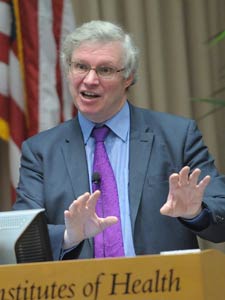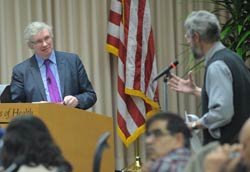Fogarty hosts global health advocate Crisp
March/ April 2011 | Volume 10, Issue 2
Six years as chief executive of the U.K. National Health Service did not make Lord Nigel Crisp a global health advocate. His conversion followed his retirement from NHS in 2006, when he co-chaired an international task force on increasing the education and training of health workers globally and traveled widely in the developing world.

Photo by Ernie Branson
Speaking at an event hosted by Fogarty,
Lord Nigel Crisp said that health
professionals should look to low- and
middle-income countries for low-cost
innovations.
“I learned three basic lessons, “Crisp said during a well-attended lecture on capacity building sponsored by Fogarty. “Stop telling people in the developing world what to do, support the education and training of health workers in their own countries and - we have a lot to learn from them.”
A member of the British House of Lords, Crisp is the author of “Turning the World Upside Down: the search for global health in the 21st Century,” which stresses the need for co-development and mutual learning instead of traditional top-down approaches to training and health innovation. He also serves on a prominent Lancet Commission studying capacity building in health education.
Illustrating the disparities in global health resources, Crisp stated that sub-Saharan Africa has 10 percent of the world’s population, 25 percent of the disease burden and but one percent of the health workers.
Crisp said that health professionals should look to low- and middle-income countries for low-cost innovations. He cited specific methods, such as treating cases of clubfoot In Africa by early and regular manipulation of the foot when surgical intervention is not available. He noted breakthroughs in products as with the development of “new and cheaper” lenses for cataracts by Aravind Eye Hospitals in India. And Crisp also mentioned the increasing use of mobile health to deliver medical information to isolated communities and remote regions.

Photo by Ernie Branson
Lord Crisp stated that sub-Saharan Africa has
10 percent of the world’s population, 25
percent of the disease burden and one
percent of the health workers.
“Innovation is happening everywhere,” Crisp declared, adding that it has attracted commercial interest, which fosters healthy competition. Western companies, such as General Electric, are being forced to recognize and compete with lower-cost products and procedures from developing countries, he said. “If they [the West] want to stay up with where the innovation is, they need to get associated with what’s happening in countries where people are innovating in different ways,” said Crisp.
There’s also been a significant change, Crisp said, “as to what health systems look like.” There’s more of an engagement by the community, by family and women, he said.
“I’d been talking to some development people in Britain about how they were going to tackle maternal mortality in Bangladesh and they described some detailed plans,” said Crisp. “When I mentioned this to [a Bangladeshi official] and asked what the real issue about improving maternal mortality, he said, ‘Empower the women.’ And it was quite an interesting contrast to our heavily technical approach and his social approach.”
This, he said, supports the argument for co-development, because the ability to draw from other practices and traditions is essential. It may help also to avoid the faults and weaknesses of richer, developed nations. “The danger is people copying our systems … which don’t work very well at the moment,” he said. “There’s lots of good stuff in what we do, but some bad stuff, too.”
Crisp cited the benefits of working in developing countries - remembering why one joined the health profession in the first place, gaining cultural awareness - and learning specific skills and practices. “But the really important stuff is challenging our long-held ideas,” he said. The success of a program such as the Medical Education Partnership Initiative in Africa is how you’re going to blend the curriculum you’re bringing with you with what they already have and shape the future together.
More Information
To view Adobe PDF files,
download current, free accessible plug-ins from Adobe's website.